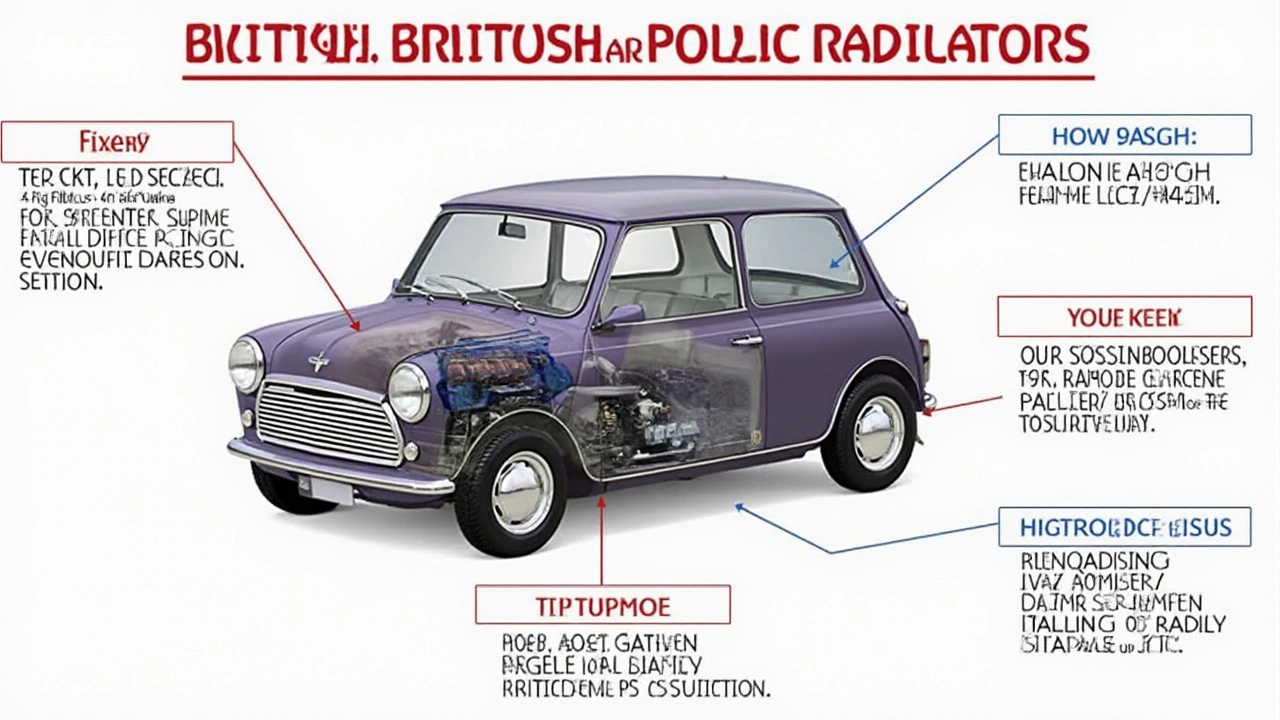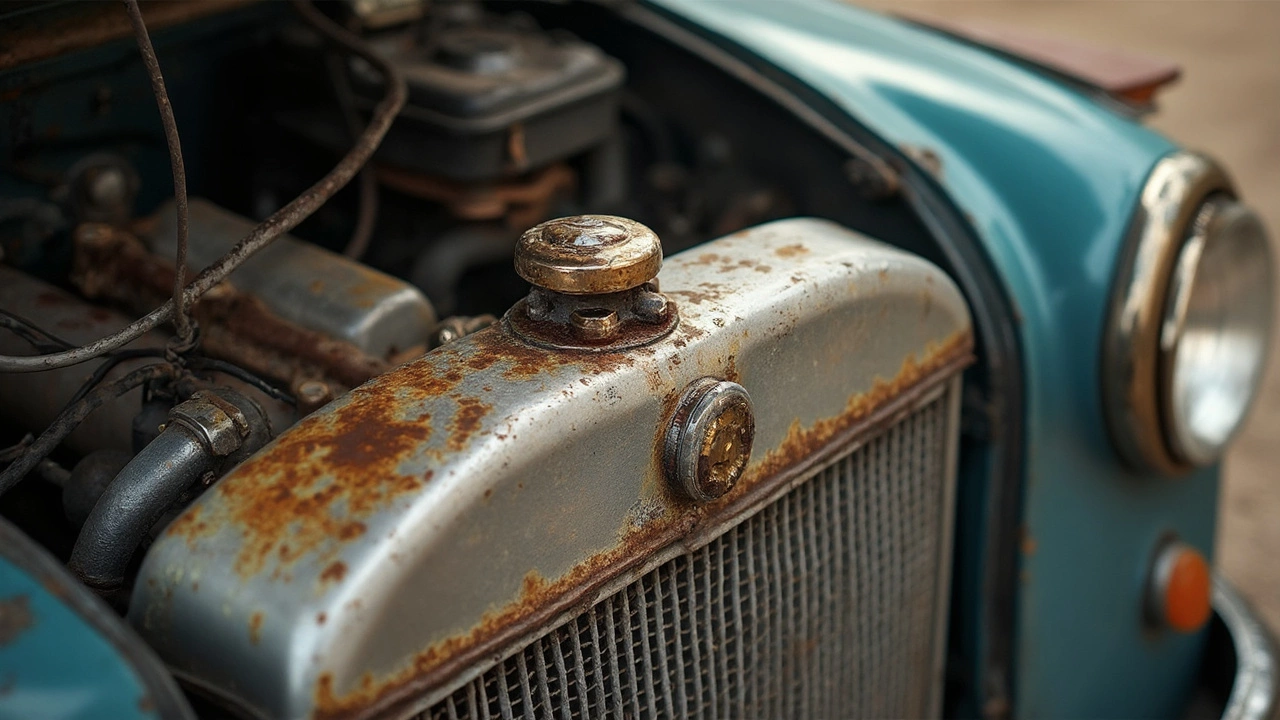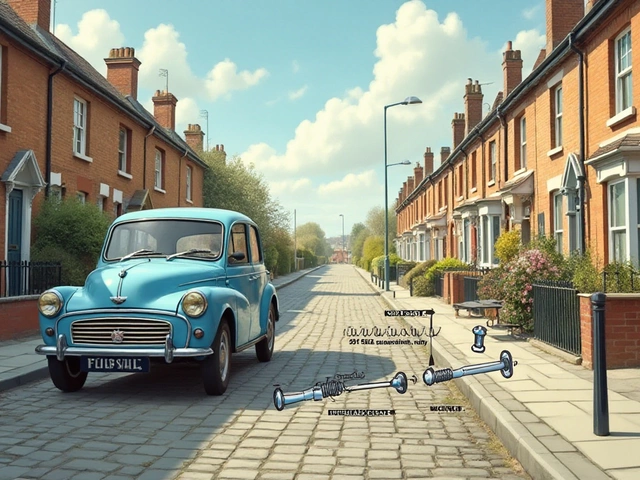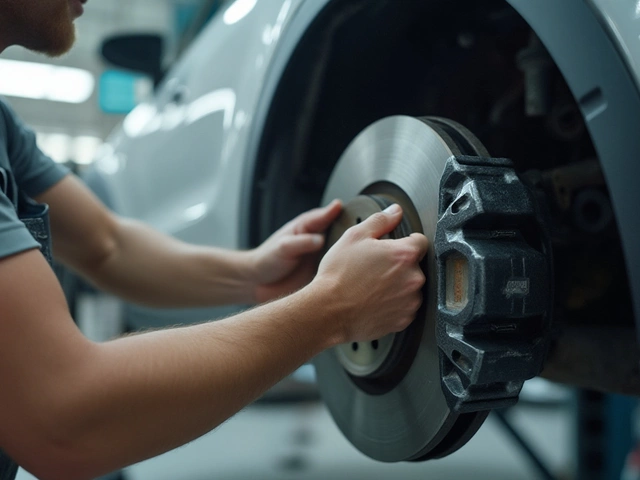Ever felt that nagging anxiety when you notice a pool of coolant gathering or your engine starts overheating out of nowhere? That little drama can sometimes mean radiator troubles. So you're left with a big question—do you throw cash at a new radiator, or can you get by with a fix?
Choosing between replacing or repairing your car’s radiator is something every car owner hopes they never have to tackle, yet it crops up more than you'd like. Whether it’s the funky noises or weird dashboard lights signaling distress, the pressure's on.
Why does it even matter, you ask? Well, the radiator is key to cooling your engine, right? So, its health directly affects how well your car runs. Ignoring it can mean frequent visits to the mechanic, or worse, getting stranded who-knows-where!
- Signs of a Failing Radiator
- Cost Comparison: Replacement vs. Repair
- Impact on Car Performance
- DIY vs. Professional Services
- Tips for Maintenance and Prevention
Signs of a Failing Radiator
Let's talk about the tell-tale signs of a car radiator repair needing attention. Spot these early, and you might save some bucks and a headache or two.
First up is the classic engine overheating. If the temperature gauge starts creeping up more often than usual, you've got trouble. It’s a top sign that your radiator isn't doing its job well.
Next, if you notice puddles of coolant under your car, it's time to check your radiator. That green or orange liquid isn't supposed to be outside your engine. Leaks can lead to bigger problems if left unchecked.
Rust or sludge buildup in your radiator is another sign. You might spot this if your coolant looks more brown than vibrant. It's not just a color issue—it can seriously gunk up your cooling system.
- Strange sounds coming from your radiator fan mean you should look under the hood. There shouldn’t be weird noises—that's usually a clue of something amiss.
- A drop in HVAC performance could also hint at radiator issues. If the heater isn't blowing warm or cool enough, the radiator might be the culprit.
Every radiator won’t show all these signs, but catching a couple early can save you from needing a costly radiator replacement later on. Always check these symptoms out with your trusty mechanic or car expert. Better to figure it out now than have surprises later, right?
Cost Comparison: Replacement vs. Repair
Okay, so your radiator looks like it's ready to give up the ghost, and you're probably wondering if it's better to fix it or go for a whole new setup. Let's break it down without getting lost in car-talk.
First off, fixing a car radiator might seem like the cheaper route. A repair usually costs between $200 to $500, depending on the damage and type of vehicle. It's a quick fix if there are just minor leaks or blockages, and it can hold your radiator together for a while.
On the flip side, replacing your radiator can set you back quite a bit more—think $500 to $1000, maybe higher depending on your car's make and model. Sounds hefty, I know. But here's the thing: if the radiator is badly damaged, a repair might only delay the inevitable. You could end up paying for repair after repair—like putting a Band-Aid on a wound that needs stitches.
| Action | Estimated Cost |
|---|---|
| Repair | $200 - $500 |
| Replacement | $500 - $1000+ |
Here's the kicker: replacing your radiator is often the more economical option long-term if the damage is serious. New radiators usually come with warranties, giving you peace of mind for at least a couple of years.
Looking to save a buck? Some folks go the DIY route. A DIY repair can cut costs significantly, as long as you're comfortable tinkering under the hood and know what you’re doing. Just be careful! For complex problems, it's better to trust the pros.
So, when deciding between repair and replacement, weigh your options. Consider the radiator's condition, possible hidden damage, and how much longer you plan to keep your ride. That'll help you figure out which path to take.

Impact on Car Performance
No one wants their car’s engine to overheat during a long drive or, worse, in the middle of traffic. A poorly functioning car radiator can lead to these scenarios, causing not just inconvenience but serious damage to the engine. If the radiator is struggling, the engine works harder, which means more heat, quicker wear and tear, and less efficiency.
Engines are like the heart of your car, and just as you can’t run a marathon with a bad heart, your car can’t perform well with a faulty radiator. Over time, continuous overheating can warp cylinders and damage pistons, which gets crazy expensive to fix. In fact, studies show that a simple radiator issue can increase engine repair costs by up to 50% if not addressed promptly.
"A well-maintained cooling system in your vehicle can extend its life significantly," says Mike Johnson, an experienced auto repair shop owner. "Ignoring radiator issues is like playing with fire. Your car’s performance and lifespan will pay the price."
To make things worse, a busted radiator can affect the car heater. If the heater starts blowing cold air, it might be because the radiator isn’t circulating coolant properly. That’s not something you want in the dead of winter!
Struggling to decide if a fix or replace is the way to go? A quick look at the age and condition of your radiator can guide you. Generally, if it’s older than 10 years or has multiple leaks, replacement is likely more cost-effective in the long run. Remember, investing in your radiator isn’t just about keeping the car running—it keeps it running well.
DIY vs. Professional Services
So, your radiator's causing trouble, and you're thinking if you should roll up your sleeves or call in a pro. This choice isn't just about money but also about how comfortable you are with tools and getting a little grease under your nails.
Car radiator repair on your own can be tempting, especially if you're the hands-on type who likes weekend projects. It often feels cheaper upfront because you’re cutting costs on labor. Plus, there’s this satisfaction in fixing things yourself. But, and it's a big but, one wrong move might lead to more damages, and let's be honest, not everyone’s garage is equipped with the right tools or space to deal with car heaters.
On the flip side, when you go with professional services, you’re paying extra for their expertise and equipment, which often translates to a more reliable fix. Mechanics know what to look for—and often faster than we’d hack our way through a YouTube tutorial. Sure, labor costs can seem hefty, but you're also getting a replacement warranty most times, which is peace of mind in itself.
Here’s a quick rundown on when you might consider DIY versus hiring a pro:
- Experience Level: If you’ve tinkered with cars before and understand the radiator system, doing it yourself might be worthwhile.
- Symptom Complexity: A simple leak or clog could be a DIY, but unexplained overheating might need a professional diagnosis.
- Time and Tools: Factor in your available time and access to necessary tools. If either is lacking, a mechanic might be your best bet.
- Budget: Calculate if your potential mistakes and time spent outweigh a mechanic’s fee.
To give you an idea, here's a basic view of costs:
| Service | DIY Costs | Professional Costs |
|---|---|---|
| Parts (Radiator and Coolant) | $100 - $300 | $100 - $300 |
| Labor | $0 (Your time) | $200 - $450 |
| Total Estimate | $100 - $300 (plus your time and effort) | $300 - $750 |
Summing up, tackling a radiator replacement or repair yourself can feel rewarding, but don't underestimate the convenience and assurance that comes with professional radiator replacement or repair. Choose the route that fits your confidence level and your wallet, but always consider the possible long-term impacts on your car’s health.

Tips for Maintenance and Prevention
Keeping your car radiator in tip-top shape isn't rocket science. It just takes a little routine care and attention to avoid costly radiator replacement costs down the road. Let's dive into some simple tips that can make a world of difference for your vehicle’s longevity and efficiency.
First things first, regularly checking the coolant level in your radiator is essential. Low coolant can lead to overheating and potential engine damage. Make it a habit to peek under the hood every month or so.
- Top Off Coolant: Always use the type of coolant recommended for your specific car model. Mixing different kinds can cause issues.
- Visual Inspection: Take a look at your radiator and its hoses for any signs of leaks, corrosion, or damage. Catching these early can prevent bigger problems.
- Flush The System: A radiator flush should be on your to-do list every couple of years. This helps to remove built-up debris and ensures the system runs smoothly.
- Replace Old Hoses: Cracked or worn-out hoses can be unreliable. Inspect these during your regular checks and replace them if they seem sketchy.
Another important aspect is maintaining proper airflow around the radiator. Sometimes, debris can block airflow, reducing its effectiveness.
- Clear the Front of Debris: Leaves and dirt can collect in front of the radiator. Gently clean these off with a cloth or a soft brush.
- Inspect the Fan Belt: A worn-out fan belt can affect airflow. Check the tension and condition of the belt to ensure it’s doing its job.
Also, pay attention to your car heating issues. Constant temperature fluctuations could hint at radiator trouble. Use caution if you decide to handle things on your own, or consult with a pro for the best advice.
Need a quick refresher on how often to stay on top of things? Here's a handy table to jog your memory:
| Task | Frequency |
|---|---|
| Check Coolant Level | Monthly |
| Visual Inspection | Monthly |
| Radiator Flush | Every 2 Years |
| Inspect Fan Belt | Every 6 months |
Following these simple tips can help keep those pesky car heater problems at bay and avoid unexpected visits to the shop. Remember, a little time spent now can save a lot of money and stress later on!




